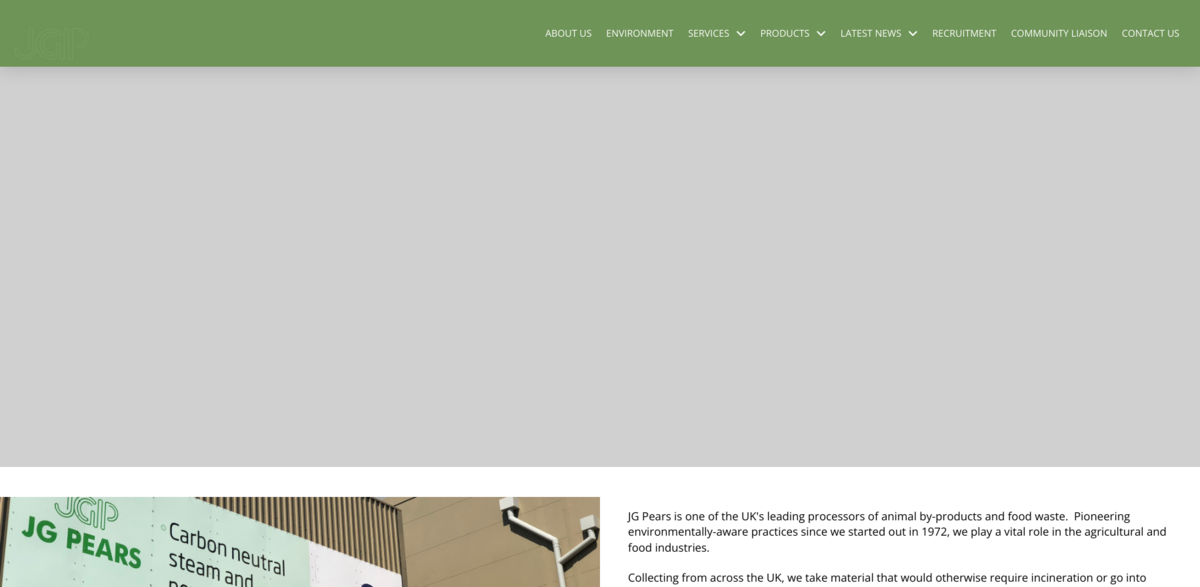What is JG Pears?
JG Pears stands out as one of the UK’s leading processors of animal by-products and food waste. Since kicking off back in 1972, they’ve been pioneers in environmentally-aware practices, playing a crucial role in both the agricultural and food industries. Collecting material from all over the UK, they take what would otherwise be destined for incineration or landfill and transform it into sustainable, high-quality products. Their processing plants? Modern, hygienic, and packed with cutting-edge technology that ensures everything is handled in a bio-secure environment. The end result? Finished products that are fully utilized worldwide. And here’s the kicker—they operate across the group with a net zero carbon footprint. Pretty impressive, right?
Main Benefits of JG Pears’ Operations
JG Pears doesn’t just process waste—they turn it into value. Here are some key facts that highlight their impact:
- Supplies products globally, with meals and fats used as core ingredients in pet foods and aquaculture feeds.
- Operates a combined heat and power (CHP) plant that uses Category 1 meat and bone meal (MBM) to generate renewable energy.
- Produces a unique range of organic fertilizers, helping farmers boost yields and improve soil quality naturally and cost-effectively.
- Collects all three categories of animal by-products and food waste nationwide using a specialized fleet.
- Manufactures premium-grade animal fats, meal products, biofuels, and fertilizers—all processed in-house.
- Owns and operates a c.7 MW wind farm that exports electricity to the National Grid.
- Maintains full certification and approvals from DEFRA, the Environment Agency, and other key bodies.
National Reach and Collection Services
JG Pears tackles the tricky problem of disposing of animal by-products and food waste head-on. Their nationwide collection service covers farmers, abattoirs, meat processing plants, and the catering industry. Using their own fleet of specially-designed vehicles, they collect all three categories of material: parts of meat-industry animals not fit for human consumption, dead and fallen stock, and foodstuffs from shops and catering establishments. This comprehensive approach ensures that nothing goes to waste. Every bit of material collected is turned into premium-grade animal fats, meal products, biofuels, or fertilizers. They control the entire process, with all by-product processing happening at their own plants. It’s a full-circle operation—finding a new use for everything that comes through their doors.
Renewable Energy Initiatives
One of JG Pears’ standout achievements is their combined heat and power (CHP) plant. This biomass-fired facility uses meat and bone meal (MBM) to replace over 90% of fossil fuels in their business processes. MBM packs a calorific punch similar to coal, which means the plant saves more than 150,000 tonnes of carbon dioxide emissions every year. Plus, sourcing MBM locally cuts down on transport emissions too. On top of that, their wind farm—spanning their farmland—generates around 7 MW of electricity, which is exported to the National Grid. Together, these renewable energy projects showcase how JG Pears is pushing the envelope on sustainability.
Why Animal Rendering Still Matters
Rendering might be one of the oldest industries around, but it’s far from outdated. Historically, it produced candles and soaps, but today, it plays a vital role in managing over 1.75 million tonnes of animal by-products generated annually in the UK. Rendering is essential for protecting public health, the environment, and animal welfare. It’s a highly regulated process that supports the circular economy, ensuring that animal agriculture remains sustainable. Without rendering, a huge chunk of waste would pose serious environmental and health risks. So, it’s not just about recycling—it’s about safeguarding the future.
Project Impact on Sustainable Development Goals (SDGs)
- SDG 7: Affordable and Clean Energy – Through renewable energy generation via CHP and wind farm.
- SDG 12: Responsible Consumption and Production – By turning waste into valuable products and minimizing landfill.
- SDG 13: Climate Action – Achieving net zero carbon footprint and reducing CO2 emissions significantly.
- SDG 15: Life on Land – Supporting sustainable farming practices with organic fertilizers.
- SDG 3: Good Health and Well-being – Ensuring safe and responsible treatment of animal by-products.
Certifications and Industry Recognition
JG Pears holds full certification and approval from a range of respected organisations, including DEFRA, the Environment Agency, and the Animal and Plant Health Agency. They’re also part of the International Sustainability and Carbon Certification scheme, GMP+ for good manufacturing practices, and Ecostars for greener fleet operations. Their combined heat and power plant is recognized under the CHP Quality Assurance Programme, and they participate in the Renewables Obligation scheme. On top of all that, they’re members of the European Fat Processors and Renderers Association (EFPRA). These credentials underline their commitment to quality, sustainability, and regulatory compliance—making them a trusted name in the industry.


















